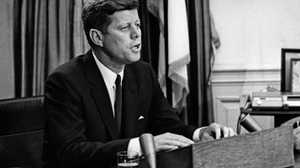Letter from Khrushchev to Castro, 10/30/62
The Soviet leader analyzes the outcome of the crisis and justifies his actions to Castro.
Letter from Nikita Khrushchev to Fidel Castro
October 30, 1962
Dear Comrade Fidel Castro:
We have received your letter of October 28, along with the reports of the conversations that you and President Dorticos had with our ambassador.
We understand your situation and are taking into account your difficulties in this first stage following the elimination of the maximum tension that resulted from the threat of an attack by American imperialists which you expected at any moment.
We understand that for you certain difficulties may have emerged as a consequence of the promises we made to the United States to withdraw the missile bases from Cuba in exchange for their promise to abandon their plans to invade Cuba and to prevent their allies in the Western hemisphere from doing so, to end their so-called "quarantine" -- their blockade of Cuba. This commitment has led to an end to the conflict in the Caribbean, a conflict which implied, as you can well understand, a superpower confrontation and its transformation into a world war where the missiles and thermonuclear weapons would have been used. According to our ambassador, certain Cubans feel that the Cuban people would prefer a different kind of statement, one that would not deal with the withdrawal of the missiles. It is possible that such feelings exist among the people. But we, politicians and heads of state, are the people's leaders and the people do not know everything. This is why we must march at the head of the people. Then they will follow and respect us.
If, by giving in to popular sentiment, we had allowed ourselves to be swept up by the more inflamed sectors of the populace, and if we had refused to reach a reasonable agreement with the government of the USA, war would have probably broken out, resulting in millions of deaths. Those who survived would have blamed the leaders for not having taken the measures that would have avoided this war of extermination.
The prevention of war and of an attack on Cuba did not depend only on the measures taken by our governments, but also on the analysis and examination of the enemy's actions near your territory. In short, the situation had to be considered as a whole.
Some people say that we did not consult sufficiently with each other before taking the decision of which you know.
In fact, we consider that consultations did take place, dear Comrade Fidel Castro, since we received your cables, one more alarming than the other, and finally your cable of October 27 where you said that you were almost certain that an attack against Cuba was imminent. According to you it was only a matter of time: 24 or 72 hours.
Having received this very alarming cable from you, and knowing of your courage, we believed the alert to be totally justified.
Wasn't that consultation on your part? We interpreted that cable as a sign of maximum alert. But if we had carried on with our consultations in such conditions, knowing that the bellicose and unbridled militarists of the United States wanted to seize the occasion to attack Cuba, we would have been wasting our time and the strike could have taken place.
We think that the presence of our strategic missiles in Cuba has polarized the attention of the imperialists. They were afraid that they would be used, which is why they risked wanting to eliminate them, either by bombing them or by invading Cuba. And we must recognize that they had the capability to put them out of action. This is why, I repeat, your sense of alarm was totally justified.
In your cable of October 27 you proposed that we be the first to carry out a nuclear strike against the enemy's territory. Naturally you understand where that would lead us. It would not be a simple strike, but the start of a thermonuclear world war.
Dear Comrade Fidel Castro, I find your proposal to be wrong, even though I understand your reasons.
We have lived through a very grave moment, a global thermonuclear war could have broken out. Of course the United States would have suffered enormous losses, but the Soviet Union and the whole socialist bloc would have also suffered greatly. It is even difficult to say how things would have ended for the Cuban people. First of all, Cuba would have burned in the fires of war. Without a doubt the Cuban people would have fought courageously but, also without a doubt, the Cuban people would have perished heroically. We struggle against imperialism, not in order to die, but to draw on all of our potential, to lose as little as possible, and later to win more, so as to be a victor and make communism triumph.
The measures which we have adopted have allowed us to reach the goal which we had sat when we decided to send the missiles to Cuba. We have extracted from the United States the commitment riot to invade Cuba and not to allow their Latin-American allies to do so. We have accomplished all of this without a nuclear war.
We believe that we must take advantage of all the possibilities to defend Cuba, to strengthen its independence and sovereignty, to thwart military aggression, and to prevent a global thermonuclear war in the present stage.
And we have succeeded.
Of course we have made concessions, we have made certain commitments. We have acted on the principle of reciprocal concessions. The United States has also made concessions, it has committed itself publicly, before the whole world, not to attack Cuba.
Therefore, if we compare a U.S. attack and thermonuclear war on the one hand, and on the other hand the commitments made, the reciprocal concessions, the guarantee of the inviolability of the Republic of Cuba, and the prevention of a world war, then I think that the conclusion is clear.
Naturally, in the defense of Cuba and of other socialist countries we cannot trust the promise of the U.S. (not to invade Cuba). We have taken, and will continue to take, every measure to strengthen our defenses and to accumulate the forces necessary to carry out a counter-strike. At this time, with the weapons we have given Cuba, it is able to defend itself more than ever. Even after the dismantling of the missile sites you will have weaponry sufficiently powerful to push back the enemy on land, sea, and air near your territory.
Furthermore, as you will recall, we stated in our message to the president of the United States on October 28 that: "we wish at the same time to assure the Cuban people that we are at its side and that we will not abandon our responsibility to help the Cuban people." It is clear to everyone that this is a very serious warning which we are addressing to the enemy.
You stated in the meetings that one cannot trust the U.S. Of course you are right. Your statements on the conditions for negotiations with the United States are equally correct. Having shot down a U.S. aircraft over Cuban territory was in the end a useful act because it ended without complications. It is a lesson for the imperialists. Of course our enemies will interpret the events in their own way. The Cuban counter-revolution will also attempt to rear its head. But we-believe that you have total control over the internal enemy without our help. The most important thing which we have achieved is to stop, for the time being, an attack by external enemies.
We consider that the aggressor has suffered a defeat. He was preparing to attack Cuba, but we stopped him and have forced him to pledge to the world that he will not do so at this time. We believe that this is a great victory. Of course, the imperialists will not stop fighting against communism. But we also have our plans and we will make our decisions. This process of struggle will last for as long as there exists on this earth two sociopolitical systems, until one of the systems, and we know that it will be our communist system, triumphs world-wide.
Comrade Fidel Castro, we have decided to send you this answer as quickly as possible. We will conduct a more detailed analysis of what took place in a letter which we will soon send you. In that letter we will make a more in depth analysis of the situation and will give you our opinion on the results of the settlement of the crisis.
At this time, the negotiations on a settlement are beginning and we ask you to communicate your position to us. We, for our part, will keep you informed on the progress of the negotiations and make the necessary consultations.
Comrade Fidel Castro, we wish you all possible success, and I am sure that you will achieve it. There are still machinations against you. But with you, we intend to take all the steps to thwart them and to contribute to the strengthening and development of the Cuban Revolution.
Nikita Krushchev






